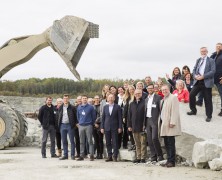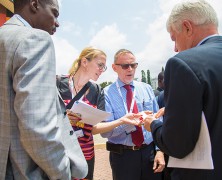From 22-24 September, more than 130 quarries and plants in 27 countries opened their doors welcoming around 30.000 children and adults to celebrate European Minerals Day and have the rare opportunity to explore the world of minerals and experience how they are sustainable extracted. Typical activities include school visits, guided tours, workshops, exhibitions, biodiversity projects, and many more have been organised. Slavko Solar, EuroGeoSurveys Secretary General stated during the launch of the European Minerals Day event: “These events convinced me that mine or quarry relationships with local community are crucial to obtain, and moreover maintain the social licence to operate. This, next to other communication activities that present mine operation , transparently opens the doors to public awareness, acceptance and finally trust as wishfully written in the EU Document entitled EIP Strategic Implementation Plan.” The 2017 European Minerals Day Launch took place on 21 and 22 September, hosted under the Estonian EU Presidency, kindly hosted by Nordkalk and Kunda Nordic Tsement at their operations in Kurevere and Kunda. It welcomed representatives from the European Commission, Estonian government, partnering sectors, academia, NGOs, media and local administrations. The balanced and insightful presentations by the guest speakers was complemented by visits of both quarry operations, the cement plant and port in Kunda, a blasting in Kurevere and introduction to the local biodiversity projects on birds and orchids. The sector is important to the EU jobs and growth agenda as it directly employs around 1 million people across 30,000 active mines, quarries and plants in Europe, and has an annual turnover of more than €150 billion. The minerals sector forms an integral part of the European value chain with 70% of EU manufacturing depending on the minerals, metals and raw materials mined. “We need to keep jobs, growth, investment and...
PanAfGeo first training on Artisanal and Small-Scale Mining
posted by EuroGeoSurveys
PanAfGeo Work Package 3 is delivering a training to African governments on managing artisanal and small-scale mining. PanAfGeo plays an important role in increasing the geological knowledge of African countries and is focused on helping governments improve estimates of their national mineral reserves in order to have a clearer view of potential revenues and increase bargaining power with mining firms. It is a collaboration between IGF (Intergovernmental Forum on Mining, Minerals, Metals and Sustainable Development), the EuroGeoSurveys (EGS) and its counterpart in Africa, the Organisation of African Geological Surveys (OAGS). The European Commission has also provided financial support for PanAfGeo’s WP3 program, which aims to deliver seven regional training sessions in 2017-2019. The first training session takes currently place in Accra, Ghana September until the 21st, 2017. More than 40 representatives from Ghana and 11 representatives from the geological surveys in neighbouring countries will be attending the training. The first training session takes currently place in Accra, Ghana until the 21st 2017 of September. The main aim of the workshop is to train staff from the Ghana Geological Survey Authority (GGSA), regulatory agencies and the universities involved in the ASM sector to strengthen their capacity to assist ASM operators in Ghana while providing regional perspectives. Particular emphasis will be on how the knowledge and skills resources of the GGSA can be mobilized more actively in the service of ASM operators so as to ensure more profitable, efficient, environmentally friendly, safe and sustainable mining operations in Ghana. ASM operations employ more than 1 million people in Ghana and provide a livelihood to approximately 4-6 million. It is estimated that legal ASM accounts for more than one third of gold exports from Ghana while the share provided by illegal ASM is unknown. Thus, while legal ASM contributes significantly to Ghana’s GDP, illegal mining...


